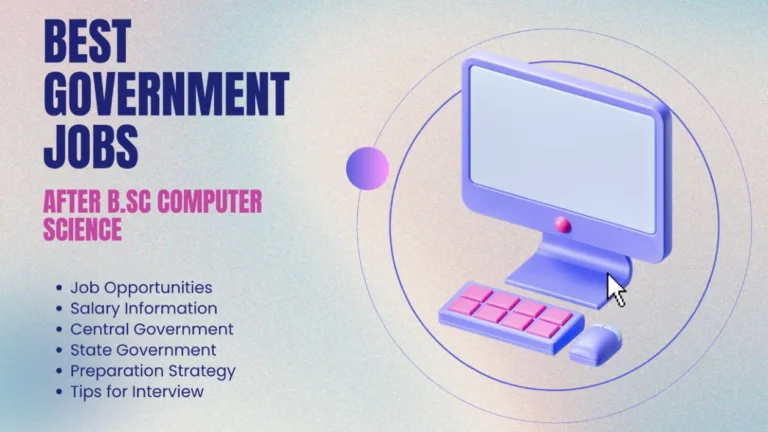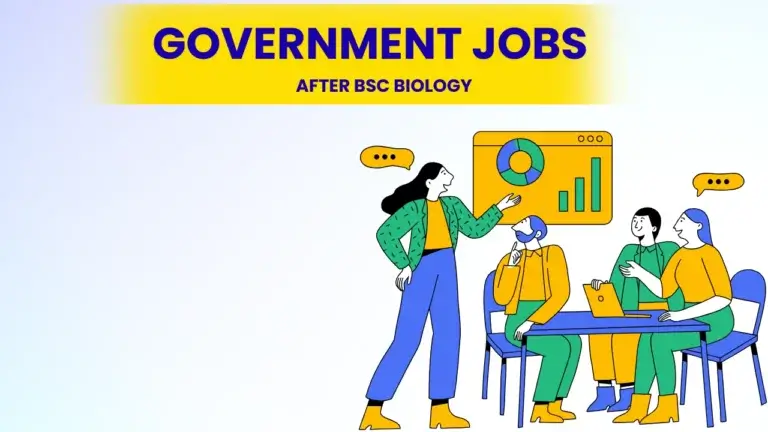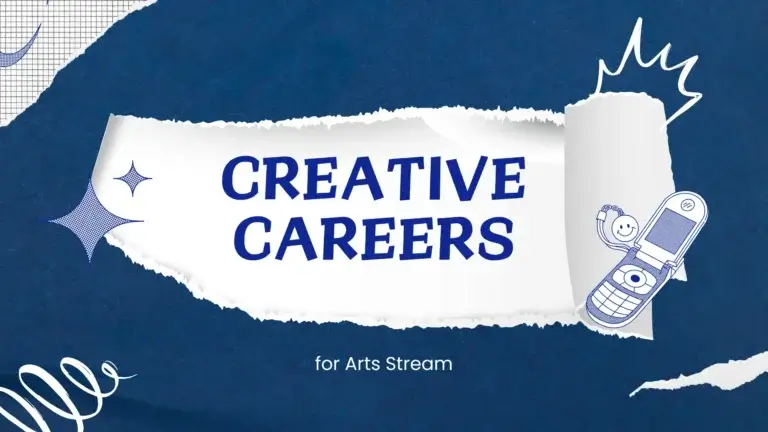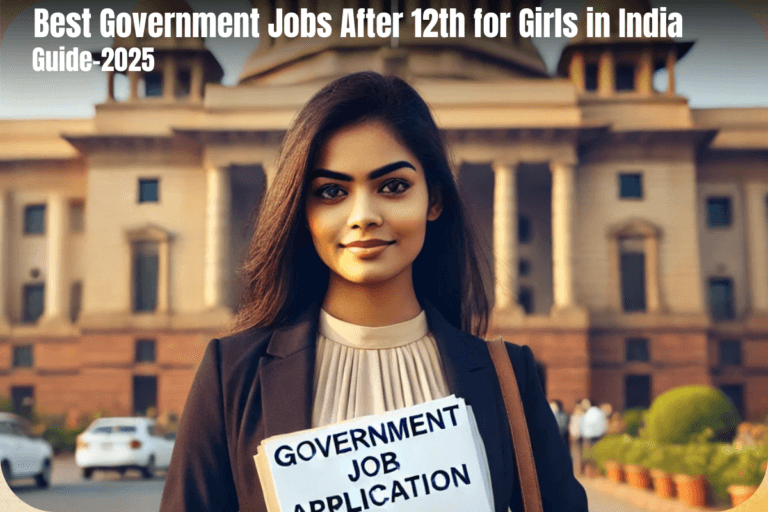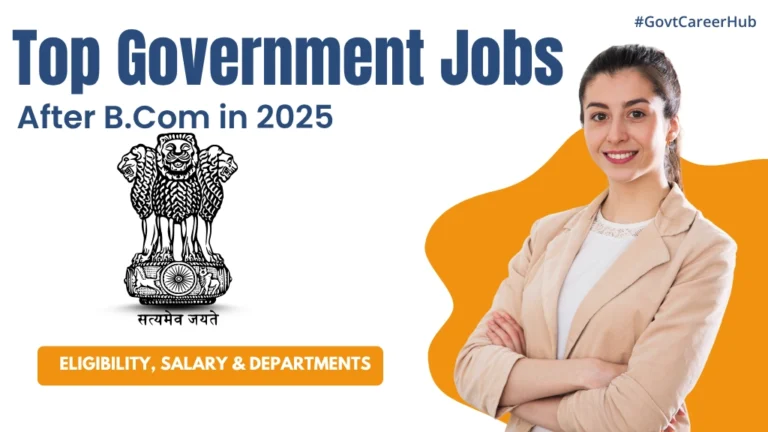Government Jobs After Engineering: Your Complete Guide to Sarkari Naukri in 2025
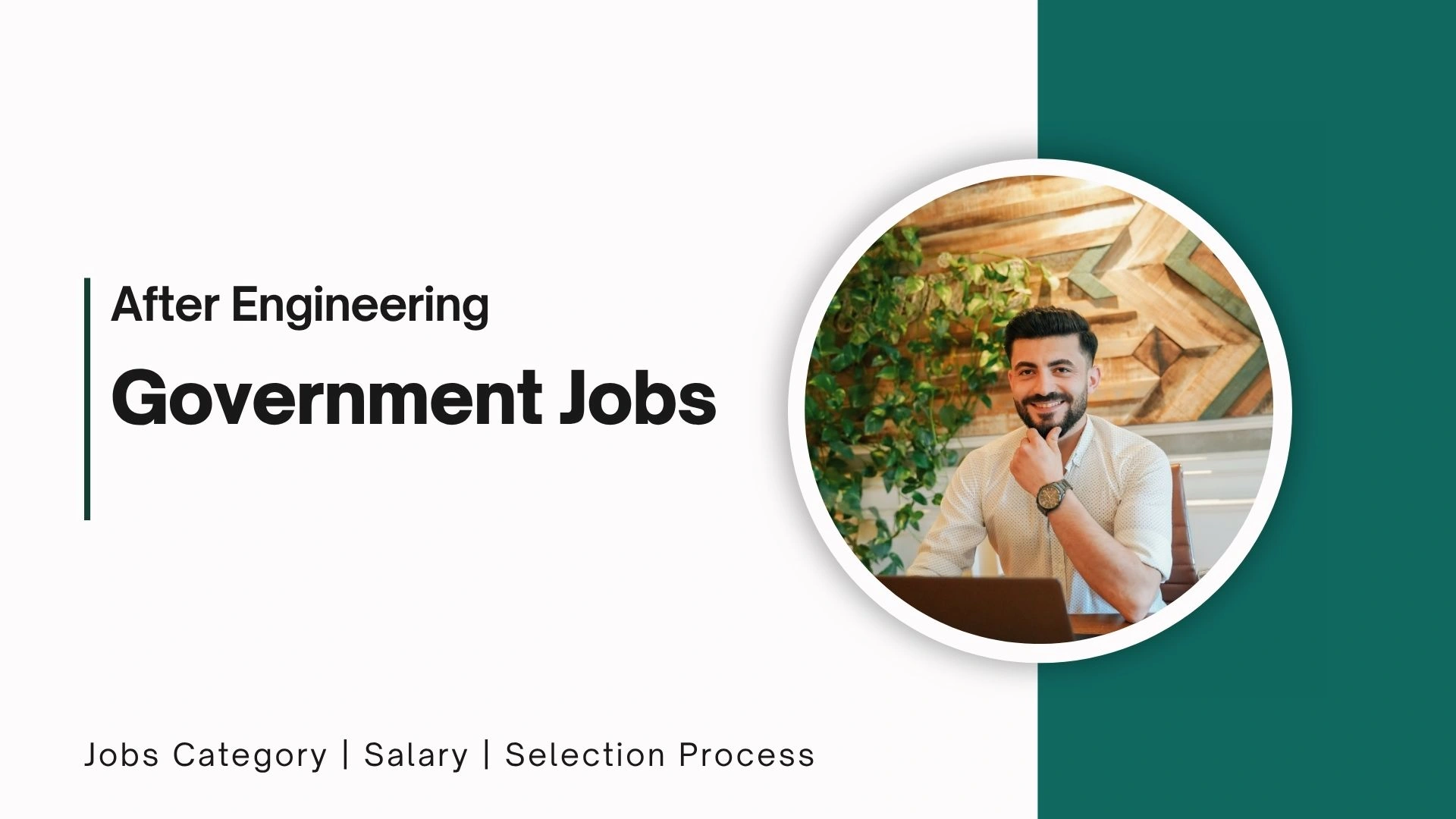
Last Updated: August 4, 2025 at 11:01 pm
Why Government Jobs Are Still the Golden Dream for Engineers?
If you’re reading this as a final-year engineering student or a fresh B.Tech graduate, you’re probably wondering: “Is there life beyond the private sector rat race?”
The answer is a resounding YES!
While your friends might be chasing hefty packages in IT companies, smart engineers know that government jobs offer something money can’t buy – job security, work-life balance, prestige, and a chance to serve the nation. Plus, let’s be honest, the salaries aren’t bad either!
In 2025, engineering graduates will have access to more government opportunities than ever before. From prestigious UPSC positions to lucrative PSU jobs, from cutting-edge research roles in ISRO to leadership positions in railways – the options are endless.
Here’s the reality check: While your batchmate might be earning ₹8 lakhs in a private company today, you could be earning ₹12-15 lakhs in a PSU with job security that lasts a lifetime.
- Why Government Jobs Are Still the Golden Dream for Engineers?
- 1. UPSC Engineering Services Examination (ESE) – The Crown Jewel
- 2. PSU Jobs Through GATE – The Engineer's Paradise
- 3. Indian Railways – The Backbone of India
- 4. DRDO & ISRO – Where Innovation Meets National Pride
- 5. Staff Selection Commission (SSC JE) – The Volume Player
- 6. State Public Service Commissions – Your Local Gateway
- 7. Banking Sector – The Tech Revolution
- 8. Teaching & Academia – Shape Future Engineers
- Comparison Table: Government Job Sectors for Engineers
- Frequently Asked Questions (FAQs)
- Pro Tips for Cracking Government Job Exams
- Your Journey to Sarkari Naukri Starts NOW!

1. UPSC Engineering Services Examination (ESE) – The Crown Jewel
What is it? The UPSC ESE is often called the “IAS for Engineers.” The exam will be held on 8th June 2025 for the prelims test. Earlier, the revised UPSC IES Notification 2025 was released for a total of 457 vacancies.
Eligible Streams:
- Civil Engineering
- Mechanical Engineering
- Electrical Engineering
- Electronics & Telecommunication Engineering
Selection Process: The selection process includes a Prelims and a Mains Examination, followed by a Personality Test/Interview.
Salary Package: The starting basic pay of a newly recruited IES officer is Rs. 56,100. Along with the basic pay, they are entitled to several other benefits such as Dearness Allowance, House Rent Allowance, Transport Allowance, and many more.
Job Profile:
- Assistant Executive Engineer in various ministries
- Infrastructure development projects
- Policy formulation and implementation
- Direct interaction with ministers and secretaries
Why Choose ESE? ESE officers enjoy Group A status – the highest level in the government hierarchy. You’ll be making decisions that impact millions of lives while enjoying unparalleled job security and respect.
Read Also
- UPSC Exam Calendar 2025: Complete Guide to Upcoming Exams
- How to Start UPSC Preparation from Zero Level- The Best Guide
2. PSU Jobs Through GATE – The Engineer’s Paradise
The Game-Changer: PSUs or Public Sector Undertakings offer job opportunities for those students who qualify for the GATE exam, making GATE your gateway to some of India’s most prestigious companies.
Top PSUs Recruiting in 2025:
- Oil & Gas: ONGC, IOCL, BPCL, GAIL
- Power: NTPC, PGCIL, NHPC
- Metal & Mining: SAIL, COAL India, NMDC
- Engineering: BHEL, HAL, BEL
- Telecom: BSNL, MTNL
Salary Range: The PSU’s job salary through GATE ranges between Rs. 7,00,000 and Rs. 18,00,000 and varies with the respective PSU’s guidelines.
Selection Process:
- GATE Score (Primary criteria)
- Written Test (Some PSUs)
- Group Discussion/Interview
- Document Verification
Positions Available:
- Executive Trainee (ET)
- Graduate Engineer Trainee (GET)
- Management Trainee (MT)
- Officer Trainee (OT)
Pro Tip: Different PSUs have different GATE cutoffs. A GATE score of 600+ opens doors to top-tier PSUs like ONGC and NTPC.
3. Indian Railways – The Backbone of India
Why Railways? With the largest network in the world, Indian Railways offers diverse opportunities for engineers across all disciplines.
Key Positions:
- Junior Engineer (JE) – Starting salary ₹35,400 + allowances
- Section Engineer (SE) – ₹47,600 + allowances
- Assistant Divisional Engineer (ADE) – ₹56,100 + allowances
Recruitment Boards:
- RRB JE: For Junior Engineer positions
- RRB SSE: For Senior Section Engineer positions
- UPSC: For higher-level positions
Work Areas:
- Signal & Telecommunication
- Electrical Engineering
- Mechanical Engineering
- Civil Engineering
Perks:
- Free railway passes for family
- Medical facilities
- Job security
- Opportunities for rapid promotion
4. DRDO & ISRO – Where Innovation Meets National Pride
DRDO (Defence Research and Development Organisation)
Entry Point: Scientist B through GATE/NET Starting Salary: The DRDO Scientist salary (basic salary) for the Scientist B position starts from ₹ 56,100 per month
What You’ll Work On:
- Advanced weapon systems
- Cybersecurity solutions
- Aerospace technology
- Material science research
ISRO (Indian Space Research Organisation)
Entry Routes:
- ICRB (ISRO Centralized Recruitment Board) – For fresh graduates
- Direct recruitment – For experienced candidates
Salary Structure:
- Scientist/Engineer SC: ₹56,100 (starting)
- Scientist/Engineer SD: ₹67,700
- Plus excellent research facilities and foreign exposure
Dream Projects:
- Chandrayaan missions
- Mars exploration
- Satellite technology
- Space stations
5. Staff Selection Commission (SSC JE) – The Volume Player
What makes SSC JE special?
- Massive recruitment – Thousands of vacancies annually
- Pan-India postings – Choose your preferred state
- Quick selection process – Results within 6 months
Departments:
- Central Water Commission (CWC)
- Central Public Works Department (CPWD)
- Border Roads Organisation (BRO)
- National Technical Research Organisation (NTRO)
Salary: ₹35,400 – ₹1,12,400 (7th Pay Commission)
Selection Process:
- Paper I – General Intelligence, General Awareness
- Paper II – Technical paper (stream-specific)
- Document Verification
6. State Public Service Commissions – Your Local Gateway
Why Consider State PSCs?
- Lower competition compared to national exams
- Local language advantage
- Faster career progression in state services
- Work close to home
Common Positions:
- Assistant Engineer (AE) – ₹44,900 – ₹1,42,400
- Junior Engineer (JE) – ₹35,400 – ₹1,12,400
- Executive Engineer (EE) – ₹56,100 – ₹1,77,500
Major State PSCs:
- UPPSC (Uttar Pradesh)
- MPSC (Maharashtra)
- BPSC (Bihar)
- RPSC (Rajasthan)
- KPSC (Karnataka)
7. Banking Sector – The Tech Revolution
Hot Opportunity: IT Officer positions in banks
Eligible Streams:
- Computer Science/IT
- Electronics & Communication
- Information Technology
Major Recruiters:
- SBI (IT Officer) – ₹23,700 – ₹42,020 + allowances
- IBPS Specialist Officer – ₹23,700 – ₹42,020
- RBI (Assistant Manager) – ₹35,150 – ₹62,770
Work Profile:
- Core banking solutions
- Cybersecurity implementation
- Digital banking initiatives
- ATM network management
8. Teaching & Academia – Shape Future Engineers
Entry Routes:
- GATE → M.Tech → Assistant Professor
- NET-JRF → Ph.D → Assistant Professor
- NIELIT → Lecturer in Polytechnics
Institutions:
- IITs/NITs – ₹57,700 – ₹182,200 (Assistant Professor)
- Government Engineering Colleges – ₹47,600 – ₹151,100
- Polytechnics – ₹35,400 – ₹112,400
Benefits:
- Research opportunities
- International collaborations
- Summer/winter breaks
- Academic freedom

Comparison Table: Government Job Sectors for Engineers
| Sector | Entry Exam | Starting Salary (₹) | Job Security | Growth Potential | Work-Life Balance |
| UPSC ESE | ESE | 56,100 + allowances | ★★★★★ | ★★★★★ | ★★★★☆ |
| PSU (GATE) | GATE | 7,00,000 – 18,00,000 | ★★★★★ | ★★★★☆ | ★★★★★ |
| Railways | RRB JE/SSE | 35,400 – 56,100 | ★★★★★ | ★★★★☆ | ★★★★☆ |
| DRDO/ISRO | GATE/NET | 56,100 | ★★★★★ | ★★★★★ | ★★★☆☆ |
| SSC JE | SSC JE | 35,400 | ★★★★☆ | ★★★☆☆ | ★★★★☆ |
| State PSC | State PSC | 35,400 – 44,900 | ★★★★☆ | ★★★☆☆ | ★★★★★ |
| Banking IT | IBPS/SBI | 23,700 + allowances | ★★★★☆ | ★★★★☆ | ★★★★☆ |
| Teaching | NET/GATE | 35,400 – 57,700 | ★★★★★ | ★★★☆☆ | ★★★★★ |
Frequently Asked Questions (FAQs)
Pro Tips for Cracking Government Job Exams
1. Start Early, Stay Consistent
Don’t wait for final year. Start preparation from the 3rd year itself. Even 2 hours daily can make a huge difference.
2. Master the Basics
Strong fundamentals in your core subjects will help you in technical papers across all exams.
3. Current Affairs is King
Dedicate 30 minutes daily to newspapers and current affairs. This applies to almost all government exams.
4. Practice Previous Year Papers
Nothing beats solving actual exam papers. Aim for at least 10 years of previous papers for any exam.
5. Create a Study Schedule
- Phase 1 (6 months): Complete syllabus once
- Phase 2 (3 months): Revision + Mock tests
- Phase 3 (1 month): Final revision + confidence building
6. Don’t Put All Eggs in One Basket
Apply for multiple opportunities. Many successful candidates crack 2-3 exams and then choose the best offer.
7. Stay Updated with Notifications
Follow official websites and reliable telegram channels for notifications. Missing application deadlines is the biggest mistake.
8. Network with Seniors
Connect with seniors who have cracked these exams. Their insights are invaluable.
Your Journey to Sarkari Naukri Starts NOW!
The path to government jobs isn’t easy, but it’s definitely worth it. While your friends might be working 12-hour shifts in private companies, you’ll be contributing to nation-building with job security that lasts a lifetime.
Remember: Every year, thousands of engineers crack these exams. What makes the difference is not intelligence, but consistency and smart preparation.
The best time to plant a tree was 20 years ago. The second best time is now.
Ready to Begin Your Government Job Journey?
- Assess your interests – Technical roles (DRDO/ISRO) vs Administrative (ESE) vs Corporate (PSUs)
- Check eligibility criteria for your target exams
- Create a preparation timeline with realistic milestones
- Gather study materials and join relevant communities
- Start preparing TODAY – not tomorrow, not next week
Take action now: Bookmark this guide, share it with your friends, and start your preparation journey today. Your future self will thank you for this decision!
Your dream Sarkari Naukri is just one focused preparation away. The question isn’t whether you can crack it – the question is: Are you ready to commit?
💡 Pro Tip: Save this comprehensive guide and revisit it whenever you need motivation or clarity about your government job preparation journey. Success in Sarkari Naukri isn’t about luck – it’s about smart preparation and consistent effort.
Read Also:
- ISRO ISTRAC Apprentice Recruitment 2025: Apply for Graduate, Diploma, and Trade Apprentices
- Can You Crack UPSC Without Coaching? Success Stories & Tips
- How to Prepare for Competitive Exams at Home: 3-Month Plan
- How to Crack Competitive Exams in the First Attempt: Proven Tips & Strategies for Success

